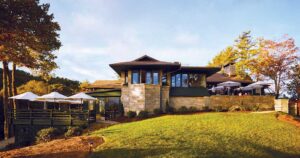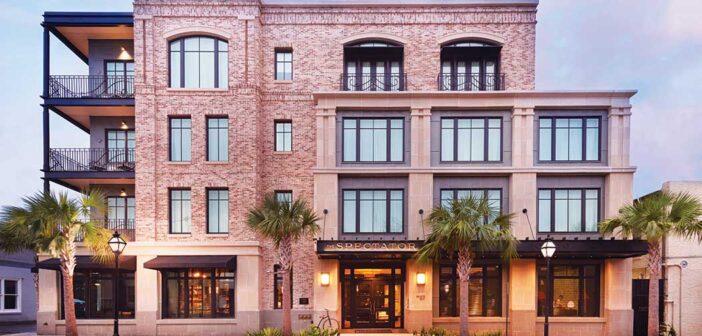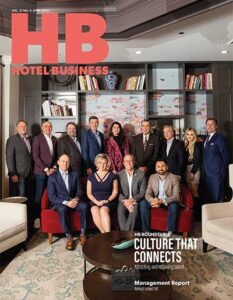As the hospitality world returns from the havoc that was created by the pandemic, leisure travel has truly come back with a vengeance. As travelers get back on vacation after being stuck at home, they are craving unique experiences, and many are choosing boutique properties.
“A lot of our properties are in leisure transient destinations, and we saw an uptick pretty quickly in Q3 of 2020, especially in the Southeast, where things opened back up,” said Kyle Hughey, CEO, Charlestowne Hotels. “People were itching to get out. There seemed to be an influx of money into the market just in terms of people who had never been able to be traveling before or had the time off. We saw some of that roll in, and we’ve seen that continue even today. It’s not really slowed down. It’s continued to grow in most of our markets and portfolios, and so we’ve benefited from it.”
Larry J. Spelts, president, lodging and lifestyle adventures, The Indigo Road Hospitality Group, said his company has seen an uptick in business, as well. “The pandemic decimated group and corporate travel, neither of which is even a drop in the bucket for our managed hotels and our destinations—small town, mountain, beach. In 2021, a lot of them beat their 2019 numbers. They not only rebounded from the pandemic closures of 2020, but just excelled, and 2022 has continued with that trend.”
Managing these boutique—and often independent—properties takes a special skill set when compared to more traditional properties—and different management companies have different ways of doing so.
“Each individual property is unique, and [the management style]is not something that is repeatable,” said Hughey. “A lot of times, our ownership groups may only be one-asset owners, and we want to make it unique to them…We just think that owners deserve and want their vision and their voice heard, and their vision executed through that property.”
Bryan Dunn, managing director, Life House, said that his company has three main verticals of how the company manages the boutique properties in its portfolio.
About a quarter of the management company’s properties have Life House as the guest-facing brand of the hotel. “We have the Life House brand, which we designed in-house,” he said. “We handle the branding in-house. Oftentimes, we’ll handle the real estate development in-house as a third-party real estate developer to our owners—a one-stop-shop solution from a branding perspective, which for folks who aspire to own an award-winning boutique hotel, but may not have the capability in-house or may not desire to assemble the array of third parties needed to go through that creative repositioning effort. The Life House brand provides a really streamlined solution.”
About 60%-70% of its portfolio is third-party management, where the company is behind the scenes. “We have our independent management platform where we’ve taken all the technology that we built to power the Life House brand from a management perspective,” said Dunn. “We’ve essentially told owners there’s no renovation or repositioning to bring on Life House to run their hotel, and [they benefit from the]decreased costs and increased revenues from all the technology that we built.”
The company’s latest vertical is a partnership with Booking Holdings and its Kayak subsidiary for the travel engine’s first brick-and-mortar property. After a successful pilot of the Kayak Miami Beach, Kayak became a major investor in the management company. “We’re cooperating on an exciting pipeline of projects and opened our next two in Playa Del Carmen [in Mexico], two fantastic boutique hotels called Kayak Luna and Kayak Sol,” he said. “We have a strong pipeline of additional larger deals under contract in major U.S. urban core locations. And, in that instance, Kayak is master leasing these properties from large, either family or institutional owners and/or partnering with buyers to acquire assets, where Kayak’s the lessee for a buyer that may be the purchaser and Life House is then the manager on Kayak’s behalf.”

With The Skyline Lodge in Highlands, NC, The Indigo Road Hospitality Group uses the property’s unique aspects to promote it to guests.
While Spelts’ company has certain attributes that are signature to Indigo Road properties—especially unique food and beverage experiences—its strategy is to focus on what’s unique about the property being managed. “[It is] making sure that it has a fully well-developed robust brand identity that’s well communicated and articulated through the visual identity or through the experience at the touch points,” he said. [It is] really focusing on that, what’s unique about it, and making sure that it’s an authentic experience.”
He said that an authentic experience is creating opportunities for discovery by the guests. “Discovery is basically just learning something new because people love it when they learn something new—whether you’re introducing them to the details about the architecture of the building, or they’re trying some new dish they’ve never had before or a new wine they’ve never tasted before,” Spelts said.
He added that creating that branding is the first thing his company does when it has a new property—whether it is opening or being repositioned. “The branding to us is extremely important,” Spelts said. “When I say ‘branding,’ I mean the name of the hotel and what it stands for, and its visual identity and how that brand identity is articulated through the experience of property.”
Creating that branding is extremely important, because the type of guest that stays at a boutique property is different. “Now it’s all about an experience,” said Charlestowne’s Hughey. “It’s all about a story told from the guest’s initial shopping online for a hotel room to arrival, the delivery of experience at the hotel and then departure and then even post-departure in terms of the follow up.”
Because guests want that story and that unique experience, they are willing to pay more. “That’s what’s driven up some of our rates because they’re not just getting that night in a bed during a stay,” he said. “They’re actually getting an experience that they could tell their friends or their followers or whomever about. It creates even more value. But, you’ve got to have that story that runs from the very start, [when they’re]searching for a hotel, to post departure. And that’s what we do well with our independents.”
While boutique properties have advantages because their unique nature attracts guests seeking out an experience, it comes with certain challenges.
“It comes with a lot of work because nothing is repeatable,” said Hughey. “You can’t take a concept for a hotel or an F&B space and just put in a similar geographical location that you think will work. Each one takes the full scope of marketing and branding into our revenue strategy and operations. All of those disciplines have to be concepted and operated differently for each individual property.”
The most important attribute for a management company in operating a boutique property, according to Hughey, is to remain agile. “For Charlestowne Hotels, if an owner says, ‘I may not be as bottom-line driven; I want to make sure that it delivers for the community and want these specific amenities for the community or for my asset,’ then we do that,” he said. “We’re not necessarily saying we can’t do that. We hear them. We hear their voice, hear what their needs are and then execute them as much as we possibly can.”
Hughey also believes that agility helped many of the independent properties get through the pandemic. “You didn’t have to check with a brand to make sure you could do safety protocols,” he said. “You decided what needed to be put in this place and put it in that place. You decided this service is going be pulled. We’re going to do breakfast different or we’re going to pull breakfast—anything like that could be decided in a matter of minutes after a thoughtful decision, within the parameters of government guidance. Generally, you could make that decision where you weren’t waiting on a brand to push down something to a mass group of properties.”





